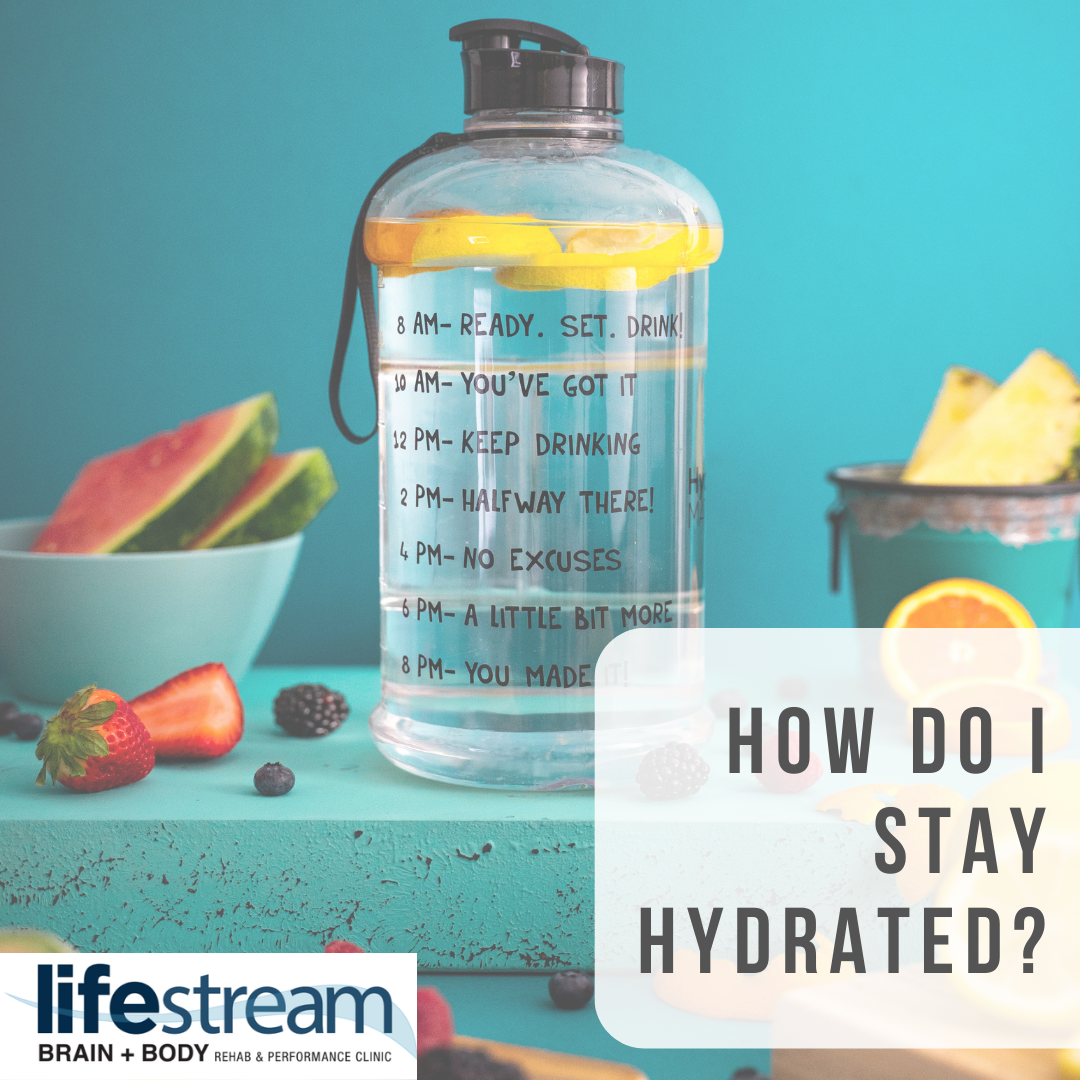How Do I Stay Hydrated?
What functions does water perform in the body, what harm can dehydration do, and should I take electrolytes?
With the blazing sun and high temperatures here this week, now is a good time to talk about the immense importance of staying hydrated.
We all know that we must drink a fair amount of water each day, and we also know that we probably do not drink enough water. Water is not often seen as a “nutrient” because it does not offer our bodies any energy; however, it is one of the most crucial nutrients because we can only live about 3 days without it.
Other than the fact that our bodies are roughly 60% water, there are many other important functions that water performs. The one that most people are aware of is the fact that water makes you pee. About 90% of your blood plasma is water which is important for the filtering process that occurs in the kidneys. Sufficient water intake is important for removing wastes out of your body through the kidneys into the urine or through bowel movements.
Another important function of water is temperature regulation. We all know that when our bodies get warm, we sweat. Sweat is produced by glands in the skin and is composed of mostly water, small amounts of various mineral salts (electrolytes) and other chemicals like ammonia and urea. The sweat vaporizes on the skin’s surface, cooling the body down. Similarly, when the body is overheated, the heat gets transferred to the blood which gets taken to the blood vessels under the surface of the skin where the heat can be transferred to the air.
You might have experienced a dehydration headache in the past as well. Even a 1 – 2% loss in body weight due to mild dehydration can result in loss of concentration and other cognitive symptoms such as headaches or short-term memory issues. The brain needs hydrated blood in order to deliver oxygen and other nutrients that are essential to its optimal functioning. Therefore, adequate hydration is essential for brain health.
A few other important functions that water performs are blood pressure regulation and heart health, transportation of nutrients, oxygen, proteins, hormones, etc. in the body, digestive health, and lubrication for muscles and joints.
Once you become dehydrated, your body begins to lose its ability to tolerate the heat stress. Therefore, it is important to stay on top of hydration especially when you are spending long periods of time in the heat, performing intense exercise, or in an area of higher elevation.
What’s the way to hydrate yourself, especially when dehydrated?
One of the signals our body has to tell us we are dehydrated is thirst. We’ve all been in the situation where we are hot and dying of thirst, and we finally get the ice cold water bottle and chug it all down in 3 seconds. However, this often results in the water getting quickly excreted in the urine instead of staying in the body to do its jobs.
There is not a standard recommendation of water for everyone because our needs change based on variables such as the weather, activity level, the presence of a virus, etc. You should be able to tell whether or not you are hydrated though.
Here are some tips for good hydration:
– Drink small amounts of water throughout the entire day instead of large amounts at a time
– Consume foods with more water in them such as fresh fruits and vegetables (dehydrated fruits and vegetables have lost most of their water content), soups, smoothies, etc.
– Carry around a glass or stainless steel water bottle during the day so you don’t forget to drink water (avoid plastic if you can as chemicals from the plastic can leech into your water- especially with acidic beverages)
– Add a slice of lemon, lime, or other types of garnishes (strawberries, basil, oranges, etc.) to improve the taste of the water
– Drink an entire glass of water when you first wake up in the morning and before you go to bed
What are electrolytes and should I take extra electrolytes?
Electrolytes are minerals in the body that have an electric charge. We need these minerals in our bodies because they help maintain our body’s pH, allow nerves, muscles, heart and brain tissue to function properly, and move nutrients into and wastes out of the cells. Parts of the water molecule have a partial charge and therefore cause it to be attracted to things with a charge like electrolytes. Therefore, the presence of glucose and electrolytes in a water solution (like in a gatorade or another sports drink) help to further increase water absorption in the GI tract. When we sweat, we lose a small amount of these essential minerals. This is the idea behind sports hydration drinks. If you are only sweating a normal amount, you are likely replenishing those electrolytes with your normal food (sodium from salt, and potassium from bananas, potatoes, cantaloupe, etc.).
However, if you are losing larger amounts of these minerals (during strenuous exercise, or with vomit or diarrhea), then you probably do need to consume additional electrolytes when rehydrating. Make sure to check with your doctor before supplementing with electrolytes as it is possible to consume too many electrolytes and your body likes to keep an equilibrium to maintain proper functioning.
In most situations, all you need to do to stay hydrated is drink plenty of water and be aware of when you may need to consume more electrolytes.
Visit lifestream.janeapp.com to schedule an appointment with one of our doctors today!
Sources:
https://www.cdc.gov/healthyweight/healthy_eating/water-and-healthier-drinks.html?CDC_AA_refVal=https%3A%2F%2Fwww.cdc.gov%2Fhealthywater%2Fdrinking%2Fnutrition%2Findex.html
https://www.ncbi.nlm.nih.gov/books/NBK279392/
https://www.ncbi.nlm.nih.gov/books/NBK507838/
https://pubmed.ncbi.nlm.nih.gov/9694412/
https://www.hsph.harvard.edu/news/hsph-in-the-news/the-importance-of-hydration/
https://cdhf.ca/en/the-importance-of-staying-hydrated-general-hydration-and-virus-recovery/
https://www.wku.edu/news/articles/index.php?view=article&articleid=2330
https://www.physiology.org/publications/news/the-physiologist-magazine/2021/july/the-science-of-hydration?SSO=Y
https://www.ncbi.nlm.nih.gov/books/NBK231118/
https://health.clevelandclinic.org/electrolyte-drinks-beneficial-or-not/

